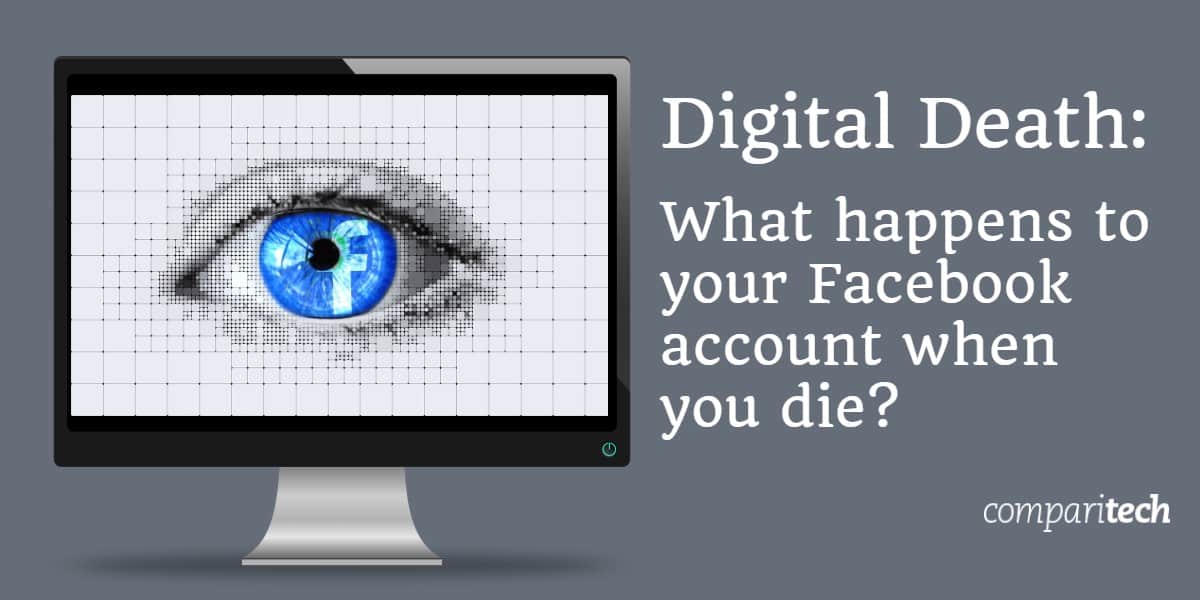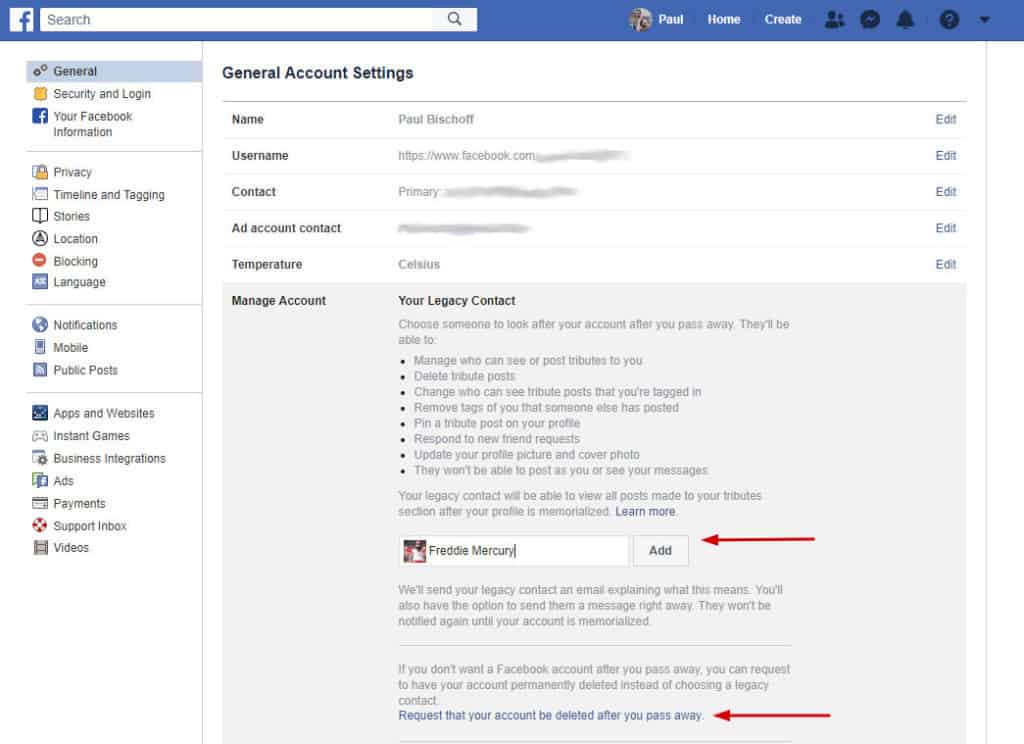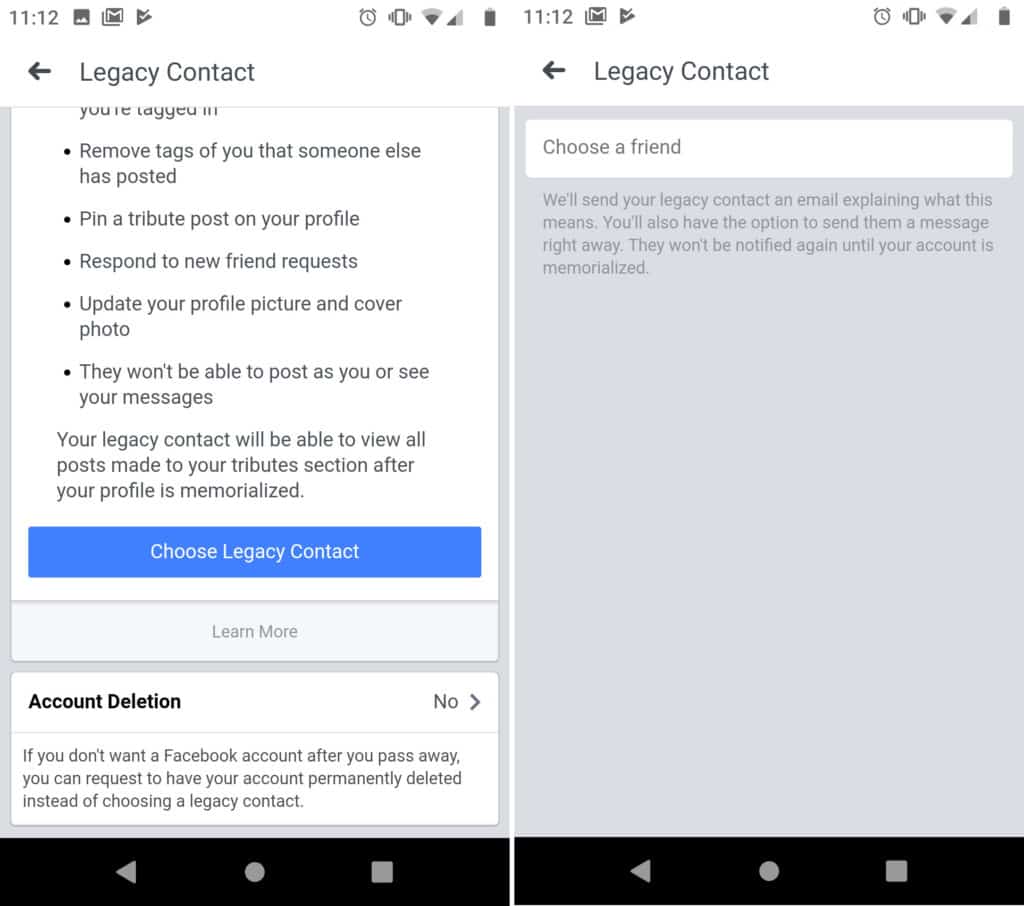
Handling a deceased person’s Facebook account might seem like a low priority in the aftermath of their death, but taking no action can have negative consequences. People will still be able to post on their timeline, tag them in photos, and send friend requests. In a worst-case scenario, the account could be hacked and used to scam friends or carry out identity fraud.
Facebook Memorialization vs Deletion
Just like leaving a will and testament, preparing your own digital assets prior to your inevitable demise will make it easier for people you trust to handle your online accounts and information. Doing so is not difficult, nor does it generally require a lawyer or power of attorney. But it does require taking a few concrete steps to ensure your digital identity is cared for in the manner that you want, by the people you want.
Facebook encourages close friends and loved ones to memorialize their accounts. Memorialized accounts allow friends and family to share memories and tributes on the deceased person’s timeline, according to whatever privacy settings are on the account. The word Remembering is displayed alongside your name. Importantly, memorialized accounts cannot be logged into, though they can be managed by legacy contacts.
The other alternative is to delete the Facebook account altogether. While this is certainly a viable option, bear in mind that the person’s profile will no longer be visible or accessible to any of their friends on Facebook, and Facebook will give no indication that the account holder is deceased. This can be rather abrupt for friends and family who keep in touch through Facebook. Also consider that a scammer could create a fake account and impersonate the deceased, with no competing genuine account to impede them.
If you don’t specify whether you prefer a memorialized account or account deletion after death, the decision will be left to your family and friends.
How to assign a legacy contact
If you opt to memorialize your account after death, you need to assign a legacy contact. This is the person who will essentially manage your memorialized account after you die.
Here’s how to set a legacy contact on Facebook if you’re on a desktop browser (Chrome, Firefox, Edge, etc):
- Click the dropdown menu in the top right corner and select Settings
- Click Manage account
- Enter a friend’s name and click Add
- Click Send to notify your friend that they are now your legacy contact
And if you’re on the mobile app (Android or iOS):
- Click the three lines at the top right corner
- Scroll down and tap Settings & Privacy, then Settings
- Scroll down to the Your Facebook Information section and tap Account Ownership and Control
- Tap Memorialization Settings
- Scroll down and enter the name of the Facebook friend who you want to be your legacy contact
- Review and edit the message as you wish, then hit Send
- Optionally, enable the Data Archive Permission to allow your legacy contact to download your posts, photos, videos, and profile info after you pass away
You’ll be prompted to enter a short message to the new legacy contact, which is sent over Facebook Messenger. It might be a good idea to reach out to them in person so they are not alarmed by the macabre message.
You can also change or remove legacy contacts as needed.
Legacy contacts can:
- Write a pinned post that sits at the top of the deceased’s profile
- Respond to new friend requests
- Manage tribute posts
- Remove tags of you in other people’s posts and photos
- Update your profile picture and cover photo
- Request your account be deleted
- Download a copy of what you’ve shared on Facebook
Legacy contacts cannot:
- Log into the deceased person’s account
- Read your messages
- Remove friends or make new friend requests
Note that if you do not assign a legacy contact or specify that you want your account deleted after death, the account will be memorialized, but no one will be able to care for it. Verified immediate family members can request deletion.
How to delete your Facebook account after you die
If you just want your Facebook account to be permanently deleted when you die, there’s no need to assign a legacy contact. Just follow these steps:
- Click the dropdown menu in the top right corner of Facebook and select Settings
- Select Manage account
- Click Request account deletion
- Choose Delete after death
On the mobile app, follow the same steps outlined above for choosing a legacy contact. Instead of clicking the Choose legacy contact button in step 5, scroll a bit lower and select Account Deletion.
What to do if a loved one dies on Facebook
If a loved one has passed away and you are responsible for handling their Facebook account, what you do next depends on whether you’ve been assigned as that person’s legacy contact or not.
To start, head to this page to submit a memorialization request. You’ll need the name on the account, the date they passed, and documentation of death, such as an obituary link or a scan of the death certificate.
Note that you should only submit a memorialization request if you’re a close friend or family member.
If you’re the legacy contact
Once someone else has assigned you as a legacy contact, you should receive a message in Facebook Messenger saying as much.
Once Facebook memorializes the account, you can manage the page as per the list above. It’s generally a good idea to leave a pinned message with information about memorial services or funeral arrangements. Facebook actually has a tool to help you run a fundraiser if necessary.
Some people who were friends outside of Facebook might try to add the deceased as a friend after the account has been memorialized. As the legacy contact, you can approve or deny posthumous friend requests.
When assigning a legacy contact, the user can check a box to determine whether the legacy contact will be allowed to download their Facebook data after death. This includes posts, photos, videos, and information from your About page. If you’re in need of photos to use for memorials, commemorations, or obituaries, this can be a helpful resource. Just be sure to take care of the information and don’t let it slip into the wrong hands. Delete whatever you don’t use.
If no legacy contact has been assigned
You can still submit a memorialization request, but chances are the account won’t be managed by anyone. The account will be memorialized, but no one will be able to respond to tributes, tags, or friend requests.
Verified immediate family members can request that the account be removed.
Creating a group page as a memorial
One alternative, if no legacy contact has been assigned, is to create a group page as a memorial. This way, you can make announcements, share memories, and give condolences in a semi-private space. Be sure to review the group’s privacy settings before inviting people.
Beware of scammers
Scammers might attempt to hack or clone the deceased’s account before it’s memorialized. This is why it’s important to request memorialization as soon as possible.
If a hacker manages to take over the account of a deceased person before it’s memorialized, they’ll be able to send messages to all of that person’s friends. Usually, their aim is to scam people. Obviously, this is dangerous for those who aren’t aware the real account holder is deceased, and distressing for those who are.
Hackers might also try to clone the account and add people from the person’s friend group as friends to the fake account. Those who accept—and many people do blindly accept friend requests—will be targeted by scams. If you or any of your Facebook friends notice this behavior, report it to Facebook immediately.




